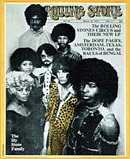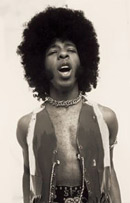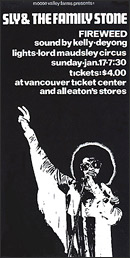|
Sly & The Family Stone, one of the greatest and most influential groups of all time, the band fused straight-ahead rock and roll with soul, funk, and pop (with some blues and jazz inflections), their innovative sound drastically influencing funk music and paving the way for disco and hip hop music while making its own impression on the guitar-based rock world. Culturally, they were the most successful, influential, and critically applauded sexually and racially integrated band of all time and proved that music, no matter how disparate the origins and styles, can unite people together from all walks of life.
The self-contained group (all members sang and played instruments) has imprinted several noteworthy contributions on the music world. Their brand of male and female vocal interplay has had a large effect on black music, and they helped introduce guitar-based rock's technology (echo chamber, vocal distortion, fuzz box, and wah-wah pedal to name a few) to the more black-based musical lexicon. Bassist Larry Graham's "slap-bass" percussive style exploited the instrument's melodic capabilities and thus created a revolutionary musical technique that was imitated by the hundreds, including by musicians as diverse as Les Claypool, Victor Wooten, Bootsy Collins, Stanley Clarke, Marcus Miller, and Louis Johnson of The Brothers Johnson.
The band also invented psychedelic soul, which greatly influenced Motown, particularly legend Norman Whitfield's work via The Temptations. Their socially conscious and political messages resonated deeply within the soul, funk, and hip hop communities and helped redefine black music.
Sly Stone himself became a legend. He was a brilliant communicator, writer-producer-arranger-bandleader-disc jockey-label owner and a talented multi-instrumentalist: he mastered the organ, bass, harmonica, drums, horn, keyboard, piano, and the guitar. He supervised hit recordings by an eclectic array of artists, from rocker Bobby Freeman to soul vocalist Gloria Scott to the pop/garage rock band The Beau Brummels. He collaborated with celebrated artists such as Bobby Womack and George Clinton to Billy Preston and Ike Turner.
Sly & The Family Stone influenced artists as wide-ranging as The Temptations, Miles Davis, Human League, Impressions, Supremes, Madonna, Four Tops, 5th Dimension, War, Frank Zappa, Isley Brothers, Michael Jackson/The Jackson 5, Kool & The Gang, Talking Heads, Herbie Hancock, Earth Wind & Fire, O'Jays, Chic, Red Hot Chili Peppers, Janet Jackson, New Edition, Prince, Rick James, Ohio Players, Stevie Wonder, Run-D.M.C., En Vogue, P-Funk, Eric B. & Rakim, The Beastie Boys, Primus, Rufus, and Public Enemy to name a few.
The Beach Boys, Aretha Franklin, Joan Jett & The Blackhearts, Pointer Sisters, Dave Matthews, Ike & Tina Turner, Etta James, Soundgarden, Gladys Knight & The Pips, Eric Burdon & The Animals, Maroon 5, The Supremes & The Temptations, Manhattan Transfer, Iggy Pop, Barry White, Duran Duran, Commodores, Meters, Red Hot Chili Peppers, Jazz Crusaders, Steven Tyler of Aerosmith, Nile Rodgers of Chic, and Booker T & The MGs are just some of the significant artists that have covered their songs.
At the age of four, Sylvester Stewart recorded his first song as a gospel singer with his family, The Stewart Four, in 1952 before moving with his family from northern Texas to northern California by decade's end. By the time Sylvester attended high school, he adopted the nickname Sly and the surname Stone and became devoted to the study of music, radio personality, and commanded a number of musical instruments including the guitar. During his high school tenure, he joined several groups, the most noteworthy being The Viscaynes, a doo-wop group. By 1961, Sly recorded his first solo single, the doo-wop influenced "A Long Time Alone," under the alias Danny Stewart, and it became a regional hit.
After having his first glimpse of success, Sly became a DJ for a San Francisco R&B radio station by 1964, even going so far as to incorporate white artists such as The Beatles, Bob Dylan, and The Rolling Stones and other rockers such as Jimi Hendrix into his playlists. He also tried his hand at producing records for Bay-area groups such as The Mojo Men, The Chosen Few, The Great Society (their "Someone to Love (Somebody to Love)" would later be co-opted by the legendary Jefferson Airplane), The Tikis, The Spearmints, and The Beau Brummels. He also spearheaded recordings by soul rockers Gloria Scott and Bobby Freeman, while revitalizing his own career with a few more solo singles (Sly produced Freeman's "C'mon and Swim" which was a hit, but ironically Sly's answer record, "I Just Learned How to Swim," fizzled). Such a hunger for diversity would later echo in his band Sly & The Family Stone.
In 1966, Sly dropped his DJ and production interests and formed The Stoners which included high school friend Cynthia Robinson on trumpet. Around this time, his brother Freddie also created his own band called Freddie & The Stone Souls which included white drummer Greg Errico. In 1967, both brothers agreed to merge to form Sly & The Family Stone, drafting Errico and Robinson into the band as well as the Stewart brothers' cousin bassist Larry Graham and later their sister Rose (who joined as a pianist in 1968). Another white musician, Sly's friend saxophonist/clarinetist Jerry Martini, too joined. A backing vocalist group called Little Sister coalesced around Sly's sister Vaetta and Vaetta's friends Mary McCreary and Elva Moulton, all former members of a gospel group. Interestingly, not only were Sly & The Family Stone inter-gendered and interracial: each member would have a prominent instrument which is a feat of equality in itself.
After gigging at local Bay-Area clubs and bars, the band debuted with the single "I Ain't Got Nobody" b/w rock and soul legend Otis Redding's "I Can't Turn You Loose" on Loadstone Records, sparking regional hit status in 1966. As a result, Columbia Records president Clive Davis signed the group to Epic Records, releasing their critically acclaimed debut effort A Whole New Thing in 1967. Though the album (and the 1967 single "Higher"b/w "Underdog") flopped, Sly Stone was determined to make a hit and pulled his sister Rose into the band ranks to record 1968's Dance to the Music.
The anthemic single "Dance to the Music" is a gloriously refreshing piece of various musical trappings all rolled into one. There are four co-lead singers, underscored by a torrential undercurrent of musical styles: gospel, doo-wop, soul/R&B, jazz, funk, straight-ahead rock, and something otherworldly that would later take on the form of disco music. The explosive, groundbreaking record was way ahead of its time and was even remixed in 1979, peaking at #36 in the US dance charts and stayed on those charts for three months. The original song was a Top 10 US pop/R&B and UK hit.
The band quickly became critically noticed for their potent amalgamation of musical sounds, multiculturalism, and legendary live performances despite the failure of their follow-up album release Life by 1968's end. November 1968's "Everyday People" b/w "Sing a Simple Song," however, redeemed them and became another hit single for the group, this time a two-sided smash.
The irresistible classic "Everyday People" embodied the band and their central message of peace, love, and equality, even if it was a mid-tempo pop number. Another anthem but this time also a social protest record, the record climbed to #1 US pop for four weeks, topped the R&B charts, and landed in the UK Top 40. The line "different strokes for different folks" became an immortal catchphrase. Even singer-songwriter Jackson Browne was inspired by this song's gospel message.
The classic two-sided 45 "Stand!" b/w "I Want to Take You Higher" reinforced Sly & The Family Stone's status as a band to be reckoned with. The energetic "Higher" was a re-recording of the song that was first released as a single in late 1967 and appeared on 1968's Dance to the Music LP. It became immortalized at 1969's Woodstock. "Stand!" was viewed as a civil rights anthem. Both were chart hits. The album Stand! was an even greater success, becoming their first US Top 20 release and went on to legendary status, spending over 100 weeks on the album charts. The album tracks "Sex Machine," "Somebody's Watching You" (Little Sister's version became the first US Top 40 hit to feature the use of a drum machine), and "Don't Call Me Nigger, Whitey" also became classics and helped solidify the band's place in the landmark Woodstock Music and Art Festival of 1969 and the landmark Newport Jazz Festival that same year.
By the time fall 1969's "Hot Fun in the Summertime" was released, Sly & The Family Stone seemed unstoppable. The record reached #2 US pop and #3 R&B and became a summer anthem jewel. Even R&B/pop icon Janet Jackson was deeply influenced by this record.
The liberating, celebratory "Thank You (Falettinme Be Mice Elf Agin)" coupled with the horn-laden slow groover "Everybody is a Star" closed the turbulent decade of the 1960s and became timeless pop pieces. The bouncy, popping funk epic "Thank You" gave the band their second US #1 pop and #1 R&B hit and prominently displayed Larry Graham's path-breaking "thumpin' and pluckin'" style.
Despite reaching the heights of stardom and acclaim, the band began to deteriorate. The Vietnam War, the race riots, The Black Panther movement's calls for the complete African Americanization of the band, and their label Epic's demands for more material took a huge toll. It's no wonder that Sly sank into depression and began to develop a high for drugs. By 1970, the band that had graced the Woodstock and Monterey festivals and the legendary Bill Graham's Fillmore's East and West began to suffer from delayed concerts and interviews. In 1971, Greg Errico had had enough and was subsequently replaced by various drummers until Andy Newmark's entrance in 1973. Despite all this, Sly managed to form Stone Flower Productions and released a few singles on his label, two of which were by Little Sister.
All this external and internal turmoil was reflected in the landmark funk opus "There's a Riot Goin On" (#1 US, #1 R&B), which spawned the across-the-board smash "Family Affair" (#1 US, #1 R&B, #14 UK). The album was dark and somber, and "Family Affair" encapsulated this. The mellow, funk-burnt, and darkly cynical song featured an infectious and influential electronic rhythm that later became a sample staple. The single eventually sold over two million copies.
By early 1972, as the band released "Runnin' Away" (#23 US, #15 R&B, #17 UK) and the small hit "You Caught Me Smilin," Larry Graham was fired from the band and was replaced by Rusty Allen. Larry went on to form the funk outfit Graham Central Station, popular for the funk classic "Jam," before venturing into a solo career, recording the soul gem "One in a Million"in 1980. The classic Fresh was introduced in the summer of 1973 and became another Top 10 pop and R&B charter, featuring the Top 20 US and Top 5 R&B "If You Want Me to Stay." Small Talk, the last album where all the members of the band recorded together, was released in the summer of 1974 and managed to break into the US Top 15 (the single of the same name was the band's last US Top 40 hit). Despite the moderate success of these influential albums and their singles, the band parted ways in January 1975. Rose Stone began a solo career as Rose Banks, and Freddie Stone joined Larry's Graham Central Station.
Sly dropped the Sly & The Family Stone band name for 1975's High on You, which was the final US pop chart hit for the 'band, "capping at #45 pop." "I Get High on You" was pulled as a single from the album and became the last important hit (#52 US pop). After 1976's Heard Ya Missed Me, Well I'm Back only reached #33 R&B, featuring the obviously deceptive Sly & The Family Stone moniker, the hits ran dry save for the album's single "What Was I Thinking in My Head?," which received disco play, and 1979's funk noodling of "Remember Who You Are" (off of the inappropriately titled Back on the Right Track album, billed as by Sly & The Family Stone). which scraped the bottom of the R&B Top 40.
By the 1980s, Sly's situation continued to dwindle as his singles, collaborations, and final album, 1983's Ain't But the One Way, again, under the Sly & The Family Stone heading, were relative failures. In 1987, he had given up on recording altogether after suffering a series of problems that included failed marriages, poor health, and legal busts. He eventually became a recluse (although he did make an appearance during Sly & The Family Stone's induction into the Rock and Roll Hall of Fame in 1993).
Although Sly & The Family Stone's zenith has come to an end, their immeasurable influence and innovation grows stronger each year as black and pop music continue to be the leading musical genres of the world. Everyone from 2Pac, The Beastie Boys, N.W.A, Queen Latifah, De La Soul, Schoolly D, Grandmaster Flash & The Furious Five, A Tribe Called Quest, Ice Cube, Ice-T, The Roots, Vanilla Ice, Alanis Morissette, Digital Underground, Dre. Dre, LL Cool J, Mary J. Blige, Naughty by Nature, Sade, Salt-N-Pepa, Soul II Soul, The Spice Girls, and TLC have all sampled their songs.
ACCOLADES
Rock and Roll Hall of Fame
Rolling Stone 100 Greatest Artists of All Time
Grammy Hall of Fame recipient
R&B Foundation Pioneer Award
SLY & THE FAMILY STONE'S MOST SAMPLED RECORDS
1. Sing a Simple Song
2. You Can Make It If You Try
3. Stand!
4. Don't Call Me Nigger, Whitey
5. I Want to Take You Higher
|

1969


Fillmore East
New York City
October 5, 1968


Larry Graham

Rose Stone


Hall of Fame
1993
|
